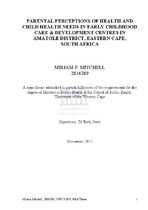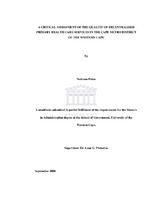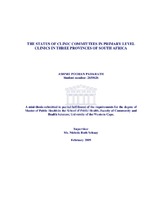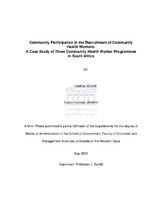| dc.description.abstract | Background: Parental perceptions of health and child health needs have not been explored within Early Childhood Care and Development (ECCD) centres in the Eastern Cape of South Africa. Although the relationship between social, economic and environmental conditions and health status has been well documented in the literature, it is unknown whether parents of children attending rural ECCD centres, share this understanding. Children have the right to a healthy environment. Many children in rural Eastern Cape live in environments that present challenges in regards to water and sanitation, food security and safety. ECCD centres are the daily environment for the attending pre-school children and have a role to play in promoting child health. In order to develop effective, sustainable health promotion initiatives in ECCD centres a baseline recording was needed of the parental understanding of health, their children’s health needs and perceived solutions. Study Design: This study was an exploratory study, which used qualitative research methods to describe the parents’ perceptions of health and health needs of their children in ECCD centres in Amathole District, South Africa. Data Collection: Focus group discussions were the data collection method used to record the parental perceptions of health and child health needs. Because there was limited parental involvement in the ECCD centres, it was hoped that the focus groups would be a suitable method to generate more community involvement. Four focus groups were conducted using a semi-structured. The researcher facilitated the focus group discussions with the assistance of an isiXhosa speaking research assistant. The voice recordings of the discussions were professionally translated and transcribed for analysis. Analysis of Results: Content analysis of the transcriptions revealed a thick description of parental perceptions of health and child health needs. Participants saw health in holistic terms and identified a complex inter-relationship of various social determinants of health, consistent with Dahlgren and Whitehead's determinants of health model. Parents were aware of the absence of many of these determinants of health and the challenges to child health that this brought. The child health needs perceived by parents were related to nutrition, hygiene, social interaction, safety and protection from disease. Five recurring themes emerged as a result of this study, including individual lifestyle factors, social interaction, environmental challenges to health, safety and lastly poverty. The ECCD centres were considered a resource for child health and suggestions were given as to how to strengthen the ECCD centres' role in further promoting health. Conclusion: The participants' broad definition of health and depth of understanding regarding the determinants of health, allows for a range of stakeholders to be involved in the promotion of health in the ECCD centres. The majority of the perceived challenges to health existed in the living conditions of the children and families. The Health Promoting Schools (HPS) framework could enhance the current work of the Eco-Schools Programme in the ECCD centres. | en_US |




